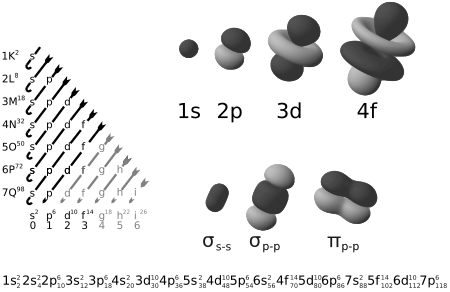Electron configuration facts for kids
Imagine an atom as a tiny solar system. At its center is the nucleus, like the sun. Around it, tiny particles called electrons orbit, much like planets. The electron configuration is simply a map showing where these electrons are located around an atom or molecule. It tells us how electrons are arranged in specific areas called atomic or molecular orbitals.
Think of orbitals as different "rooms" or "shells" where electrons can live. Each electron moves independently within its own orbital. This arrangement helps us understand how atoms behave.
Scientists use the rules of quantum mechanics to understand electron configurations. These rules explain that each electron arrangement has a certain amount of energy. Electrons can jump from one arrangement to another. When they do, they either release or absorb a tiny packet of energy called a photon.
Knowing the electron configuration of different atoms is super helpful! It helps us understand how the periodic table of elements is organized. It also explains how atoms stick together to form chemical bonds. This knowledge is even used to create cool technologies like lasers and semiconductors.
Contents
What is an Electron Configuration?
An electron configuration is like an address for every electron in an atom. It shows which energy levels and orbitals each electron occupies. This arrangement is unique for each element. It helps us predict how atoms will interact with each other.
Why Electron Configuration Matters
Understanding electron configuration is key to chemistry. It helps us explain many things:
- The Periodic Table: The way electrons are arranged helps explain why elements are placed where they are on the periodic table. Elements in the same column often have similar electron configurations. This means they have similar chemical properties.
- Chemical Bonds: Atoms form chemical bonds by sharing or transferring electrons. Electron configurations show which electrons are available for bonding. This helps us understand how different compounds are formed.
- Material Properties: The electron arrangement affects how materials behave. For example, it explains why some materials conduct electricity well (like metals). It also explains why others are insulators or semiconductors.
How Electrons Fill Orbitals
Electrons fill orbitals in a specific order. They usually fill the lowest energy orbitals first. Imagine filling seats on a bus; you fill the empty seats closest to the front first. This is similar to how electrons fill orbitals.
Rules for Electron Configuration
There are a few main rules that govern how electrons are arranged:
- The Aufbau Principle: This rule says that electrons fill orbitals starting from the lowest energy level. "Aufbau" is a German word meaning "building up."
- The Pauli Exclusion Principle: This rule states that each orbital can hold a maximum of two electrons. These two electrons must have opposite "spins." Think of spin as a tiny magnetic property.
- Hund's Rule: This rule applies when there are multiple orbitals with the same energy. Electrons will first fill each orbital singly before any orbital gets a second electron. It's like each seat on the bus gets one passenger before any seat gets a second.
Electron Configuration and the Periodic Table
The periodic table is arranged based on electron configurations.
- Elements in the same group (vertical column) have similar outer electron configurations. This is why they have similar chemical properties. For example, all elements in Group 1 (like lithium and sodium) have one electron in their outermost shell. This makes them very reactive.
- The rows (periods) on the periodic table correspond to the main energy levels being filled by electrons. As you move across a period, electrons are added to the same main energy level.
Understanding electron configuration helps us unlock many secrets of the atomic world. It's a fundamental concept in chemistry and physics!
See also
In Spanish: Configuración electrónica para niños



